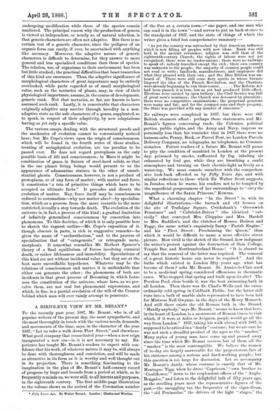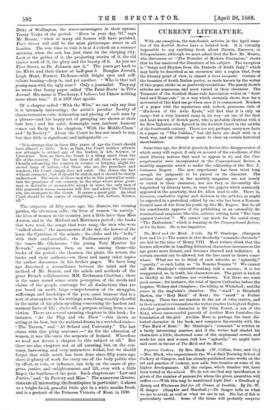A BIRD'S-EYE VIEW BY MR. BESANT.*
To the recently past year, 1887, Mr. Besant, who is, of all popular writers of the present day, the most sympathetic, and the most thoroughly in touch with the various needs, demands, and movements of the time, says, in the character of the year 1837, "Let us take a walk down Fleet Street," and elsewhere. What good company that resuscitated year—when a new reign inaugurated a new era—is, it is not necessary to say. Ex- perience has taught Mr. Besant's readers to expect with con- fidence that his work, of whatever nature it may be, will always be done with thoroughness and conviction, and will be made as attractive in its form as it is worthy and well thought out in its projection. There is something fascinating to the imagination in the plan of Mr. Besant's half-century record of progress by leaps and bounds from a period at which, as he frequently reminds us, we were still, to all intents and purposes, in the eighteenth century. The first middle-page illustration to the volume shows us the arrival of the Coronation number • Fifty Years Ago. By Walter Besaa. London : Ohatto and Windne.
of the Sun at a certain town—" one paper, and one man who can read it in the town "—and serves to put us back at once to the standpoint of 1837, and the state of things of which the writer gives a brief but comprehensive summary --
"As yet the country was untouched by that American influence which is now filling all peoples with new ideas. Rank was still held in the ancient reverence; religion was still that of the eighteenth-century Church; the rights of labour were not yet recognised; there were no trades-unions ; there were no railways to speak of; nobody travelled except the rich ; their own country was unknown to the people ; the majority of country people could not read or write ; landlords, manufacturers, and employers did what they pleased with their own ; and the Blue Ribbon was un- heard of. There were still some fiery spirits in whose breasts lingered the idea of the French Revolution, and the Chartists
were already beginning to run their course The Reform Act had been passed, it is true, but as yet had produced little effect. Elections were carried by open bribery; the Civil Service was full of great men's nominees ; the Church was devoured by pluralists ; there were no competitive examinations ; the perpetual pensions were many and fat; and for the younger sons and their progeny, the State was provided with any number of sinecures."
No railways were completed in 1837, but there were 668 British steamers afloat : perhaps these statements, and Mr. Besant's figures concerning trade, the Colonies, political parties, public rights, and the Army and Navy, impress us personally less than his reminder that in 1837 there were no
hansom-cabs, Penny, Book, or Parcel Post, no London Parcels Delivery Company, no telegraphs, no telephones, no Commis- sionaires. Future readers of a future Mr. Besant will pause to pity the condition of mankind in London at the present
day, poisoned by smoke, suffocated by fog, inhaling air exhausted by foul gas, while they are breathing a sunlit atmosphere and turning on their electric-light as freely as a water-tap. We must console ourselves with the comprehen- sive look-back afforded us by Fifty Years Ago, and with similar reflections to those which Sir Walter Scott suggests, in Ivan/we, when he warns his readers not to be tempted by the superficial gorgeousness of her surroundings to "envy the magnificence of the Saxon Princess," Rowena.
What a charming chapter "In the Street" is, with its What a charming chapter "In the Street" is, with its delightful illustrations,—the barrack and old houses on the site of Trafalgar Square, Crnikshank's "Greenwich Pensioner" and " Cabriolet-Driver " (the identical " cab-
rioily " that conveyed Mrs. Cluppins and Mrs. Bardell to Mrs. Raddlea's, and the clutches of Messrs. Dodson and Fogg), the same artist's exquisitely funny "Parish Engine," and his "Fleet Street : Proclaiming the Queen," than which it would be difficult to name a more effective street picture. How vivid is the sketch of the Strand, how indignant the writer's protest against the destruction of Sion College,
Temple Bar, and Northumberland House ! "It is absurd to say that the removal of the latter was required. The removal of a great historic house can never be required." And the baths which existed in London fifty years ago, what has become of them ? asks Mr. Besant. St. Annice-le-Clair used to be a medicinal spring, considered efficacious in rheumatic cases. Who stopped that spring and built upon its site? The Peerless Pool, close beside it, was the best swimming-bath in all London. Then there was St. Chad's Wells and the extra- ordinarily cold spring in Coldbath Fields ; but the latter still runs into a bath of marble slabs represented to have been laid
for Mistress Nell Gwynne, in the days of the Merry Monarch. And still there exists the old Roman bath in the Strand. "Hardly anybody," says Mr. Besant, "seems to know that here, in the heart of London, is a monument of Roman times, to visit which, if it were at Arles or Avignon, people would go all the way from London." 1837, taking his walk abroad with 1887, is
supposed to be attired in a "dandy " costume ; hut we are sure he was not such a dreadful product of the ages as the "masher." Many styles of young man have come up and passed away since the time which Mr. Besant revives, but of them all the " masher " is the most contemptible. We believe the women of to-day are largely answerable for the preposterous fact of his existence among a serious and hard-working people ; but this question is too large for discussion. Let us accompany Mr. Besant's dandy, whose costume is exactly that of Mr.
Montague Tigg, when he drove 'Capricorn,' "own brother to ' Cauliflower,' " down to the resplendent offices of the " Anglo-
Bengalee," and listen to the delightful talk of fifty years ago, as the strolling years meet the representative figures of the past,—the smuggling tar, the frequenter of the cigar-divan,
the "old Peninsular," the drivers of the light "stages," the Duke of Wellington, the street-messengers in their aprons, Trotty Vecks of the period. "Even in your day, '87," says Mr. Besant, "when so many old houses will have perished, Fleet Street will still be the most picturesque street in all London. The true time to visit it is at 4 o'clock on a summer morning, when the sun has just risen on the sleeping city.
Look at the gables of it, the projecting stories of it, the old timber work of it, the glory and the beauty of it. As you see Fleet Street, so Dr. Johnson saw it." The years get back to the Mitre, and their dinner at half-past 5. Douglas Jerrold, Leigh Hunt, Forster, Dickens—with bright eyes and self- reliant bearing—drop in, and yet another. "Who is that tall
young man with the ugly nose P Only a journalist. They say he wrote that funny paper called The Fatal Boots' in Tilt's Annual. His name is Tha,ckeray, I believe, but I know nothing
more about him." It is 1837 that speaks.
Of a chapter called "With the Wits," we can only say that it is intensely interesting ; the artist's peculiar faculty of characterisation—the delineation and placing of each man by a phrase—and his happy art of grouping are shown at their best here ; and his quiet, downright, easy, lambent humour comes out finely in his chapters, "With the Middle-Class," and "In Society." About the Court he has not much to say, but that little is significant and indisputable
"It is strange that in these fifty years of age the Court should have altered so little. Now, as then, the Court neither attracts nor attempts to attract any of the leaders in Art, Science, or Literature. Now, as then, the Court is a thing apart from the life of the country. For the best class of all, those who are con- tinually advancing the country in science or keeping alight the sacred lamp of letters,—for those who are the preachers and teachers, the Court simply does not exist. One states the fact without comment ; but it should be stated, and it should be clearly understood. The whole of those men who in this generation main- tain the greatness of our country, in the ways where alone great- ness is desirable or memorable, except in arms, the only men of this generation whose memories will live and adorn the Victorian era, are strangers to the Court. It seems a great pity. An ideal Court should be the centre of everything,—Art, Letters, Science, all."
The etiquette of fifty years ago, the dinners, the evening
parties, the afternoon calls ; the lives of women "in society," the lives of women in the country, just a little later than Miss Austen, and in the Mitford and Martineau period ; the books that were read, the songs that were sung, the men who were "talked about ;" the amusements of the day, the heroes of the hour, the Cynthias of the minute ; the clubs and the "hells," with their card-scandals ; the Parliamentary athletes of the time—Mr. Gladstone, "the young Tory Member for Newark," conspicuous then, as now, among them—the bucks of the period ; the theatres, the plays, the actors, the books and their authors,—on these and many other topics the author discourses in his livelier pages. We have long ago discerned a resemblance between the mind and the method of Mr. Besant, and the minds and methods of the great French collaborators, MM. Erckmann-Chatrian ; there is the same sound sense, acute perception of the needs and claims of the people, contempt for all distinctions that are not based on merit, large comprehension of the struggles, sufferings, and hardships of the poor, quiet humour that is a sort of atmosphere in his writings, something steadily cheerful in the midst of his plain-speaking concerning the hardest and sternest facts of life ; above all, a purpose arising from a con- viction. There are several amusing chapters in this book ; for instance, "At the Play and the Show "—this shows us acting at its best, but the national drama in a wretched state- " The Tavern," and "At School and University." The last closes with this pithy sentence :—" As for the education of women, it was like unto the serpents of Ireland. Wherefore we need not devote a chapter to this subject at all." But there are also chapters not at all amusing, but, on the con- trary, harrowing, and very instructive withal, lest we should forget that while much has been done since fifty years ago,
there is plenty of work for every one of the body politic who by effort, or vote, or influence, can help on the cause of pro- gress, justice, and enlightenment, and lift, even with a little finger, the burthens of the poor. Such chapters are "Law and Justice," and "In Factory and Mine." The numerous illustra- tions are an interesting, the frontispiece in particular; it show us a bright-faced, graceful little girl in a white muslin frock, and is a portrait of the Princess Victoria of Kent, in 1830.



































 Previous page
Previous page